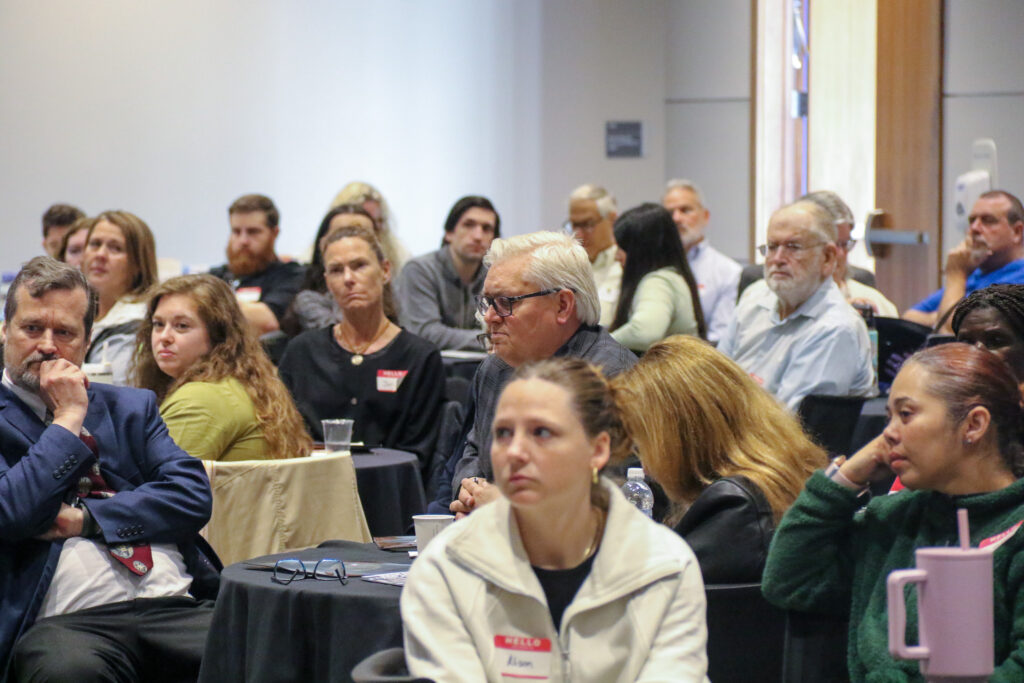Stockton/From left, Irvin Moreno-Rodriguez, interim executive director of the Holocaust Resource Center, and Toby Rosenthal, producer of 'There Were Good People ... Doing Extraordinary Deeds,' moderated a discussion with Holocaust Survivors Maud Dahme and Leo Ullman at the Holocaust educators symposium May 13.
GALLOWAY TOWNSHIP - Stockton Univerity's Sara & Sam Schoffer Holocaust Resource Center held its first-ever full-day symposium for South Jersey educators teaching about the Holocaust and genocide May 13.
The idea of the symposium was not only to provide educators with the resources to teach the Holocaust and other difficult subjects in the classroom, but to also recognize their hard work, said Irvin Moreno-Rodriguez, interim executive director of the Holocaust Resource Center. They are all making a positive impact in New Jersey classrooms. We need them to understand this now, more than ever. One person can truly make a difference."
Stockton is the largest purveyor of Holocaust education in the world, according to Yad Vashem The World Holocaust Remembrance Center. In addition to the programs offered through the Holocaust Resource Center and a Master's of Holocaust and Genocide Studies and minor of the same name, the university partners with more than 40 schools in New Jersey and Pennsylvania and teaches over 1,200 high school students annually through the Holocaust and Genocide Dual Credit Consortia.
Steve Marcus, coordinator of the consortia, said the first agreements were with Holy Spirit and Vineland high schools in 2014. The consortia provides opportunities for professional development for teachers, access to special exhibits and performances, and four college credits for enrolled students.
It's a popular class for seniors, with about 20 students enrolled each year, said John Clement, who will take over teaching the Holocaust & Genocide Studies dual-credit course at Holy Spirit High School in Absecon this fall.
It's not just the history, it's the empathy that comes with the class, it's relating to things currently going on in the world, evaluating media and the role of propaganda that makes the course valuable to high school students, Clement said.
During another session, Michael Hayse, associate professor of History, shared with attendees how Stockton developed its Holocaust Survivors of South Jersey Project.
Those stories, if they weren't told, weren't recorded, were lost, he said, recalling how he began working with a student who scoured newspapers from the 1940s, looking for names of individuals sworn in as American citizens. Ultimately, they located hundreds of survivors who settled in southern New Jersey. These are people who otherwise would not have been recognized. To me that is very, very important.
 The full-day symposium at the John F. Scarpa Academic Center at Stockton Atlantic City welcomed nearly 80 educators from more than 30 K-12 schools in southern New Jersey.
The full-day symposium at the John F. Scarpa Academic Center at Stockton Atlantic City welcomed nearly 80 educators from more than 30 K-12 schools in southern New Jersey.
The growing database contains 1,803 survivor names, and the center continues to gather more information and build profiles of these individuals.
Senior Michaela Spain is using a fellowship through the Stockton Board of Trustees and an internship with the Holocaust Commission the New Jersey Department of Education this summer to write curriculum based on these survivor profiles that can be incorporated by educators in the classroom in grades 7-12.
I'll be designing lesson plans, worksheets and projects to go along with standing Holocaust lessons. We can create more profound lessons for students and make them feel more connected by sharing the stories of local survivors, she said.
These are lessons of bullying, being an upstander and resilience. Everyone can relate to that, Spain said.
Her project will make about 100 profiles accessible to teachers to use as a research tool later this year.
The symposium also hosted a panel discussion with survivors Maud Dahme and Leo Ullman. Both were hidden children in the Netherlands during the Holocaust. Dahme spent three years hidden, from the ages of 6-9, while Ullman was only 3 when his parents gave him away.
I was not aware of the war. I was not aware the people I lived with were not my parents. I was with people who loved me, Ullman said, sharing that after 2.5 years in hiding, he transitioned back to living with his parents. That was difficult for all of us.
The symposium was conceived by Moreno-Rodriguez, and Steve Beatty, vice president of the NJEA, who met on a study-tour to Germany in 2023 through the New Jersey Commission on Holocaust Education.
The point of journey was to bring back what we learned. We decided to get people together, Beatty said.
The Sara & Sam Schoffer Holocaust Resource Center is hosting another free event for educators on July 22. The seventh annual Wally and Lutz Hammerschlag Summer Educator Seminar Summer Tour will take educators to sites related to the histories of Jewish agriculture and Holocaust survivors.
Contact the Holocaust Resource Center at 609-652-4699 or Stockton.edu/holocaust-resource for more information.